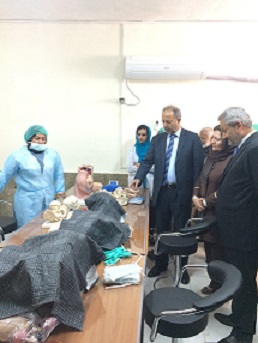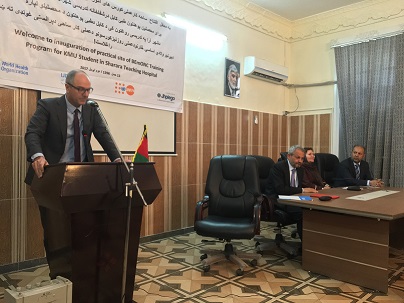 The medical skills lab is being introduced to the Ministers of Public Health and Higher Education and the Dean of Kabul Medical UniversityKabul, 19 November 2017 – Eight medical universities across Afghanistan are planning to copy a model of medical training developed in Kabul Medical University (KMU) with the support of the World Health Organization.
The medical skills lab is being introduced to the Ministers of Public Health and Higher Education and the Dean of Kabul Medical UniversityKabul, 19 November 2017 – Eight medical universities across Afghanistan are planning to copy a model of medical training developed in Kabul Medical University (KMU) with the support of the World Health Organization.
The training consists of 2 programmes which provide key capacity development for medical professionals in maternal and child health in a country, which has high rates of childhood malnutrition and one of the worst rates of maternal and child mortality in the world.
The first one is called the Integrated Management of Childhood Illnesses (IMCI), and it provides the students with training in the care of newborn babies and children under the age of 5 years with most common types of infections, monitoring of growth and childhood nutrition. The second one is called Basic Emergency Obstetrics and Newborn Care (BEmONC), and it provides students with key skills in antenatal-, delivery-, postnatal- and early newborn care and family planning.
The first 400 students completed the IMCI training in 2015, and so far, over 1000 students in the pediatric faculty of the Kabul Medical University have participated in it. The first 12 batches, over 400 students, in the obstetrics and gynecology faculty, are currently receiving training in the BEmONC programme and will complete their training in December 2017.
“The KMU model has proven to be a success,” explains Dr Paata Chikvaidze, WHO Medical officer, working on reproductive, maternal, newborn, child and adolescent health. “The IMCI strategy was adopted in Afghanistan already in 2004 with joint support from WHO and UNICEF. Initially the plan was to provide in-service trainings for practising health care providers to rapidly introduce improved child health services across the country. Later on, providing training for students in their 4th and 5th years of university studies was recognized as a more sustainable and cost effective way of supporting the capacity-building of health professionals.”
WHO signed a trilateral agreement with the Afghan Ministry of Public Health and Ministry of Higher Education to develop and integrate both IMCI and BEmONC pre-service trainings in KMU study programmes. Currently, both training programmes are running at KMU as a part of their curricula.
 WHO Representative Dr Rik Peeperkorn delivered a speech at the launch of the BEmONC pre-service training centre at the Shahr Ara Teaching Hospital
WHO Representative Dr Rik Peeperkorn delivered a speech at the launch of the BEmONC pre-service training centre at the Shahr Ara Teaching Hospital
In a speech delivered at the launch of the BEmONC pre-service training centre in the presence of the Ministers of Public Health and Higher Education and the Dean of KMU, the WHO Representative in Afghanistan, Dr Rik Peeperkorn, emphasized the importance of the quality medical training, stating that “Medical schools play a key role in preparing the future health professionals who will be providing services in the public and private sector. Investment in pre-service education is as important as other public health interventions. It is a long-term sustainable response to the health care needs of the country.”
WHO has not only supported adoption of the standard pre-service training curricula, but also provided materials, renovated and equipped training centres at the Maiwand and Shahr Ara teaching Hospitals of the Kabul Medical University. UNICEF, the United Nations Population Fund and USAID also contributed to the capacity-building of the BEmONC pre-service training centre.
With the aim of expanding the successful experience of KMU to other institutions and regions, in August 2017, WHO, the Ministries of Higher Education and Public Health and KMU sponsored a consultative workshop for 8 key national medical universities from across the country. The scale-up activities in the universities are planned to be implemented through a joint WHO-Government plan during 2018–2019.
“WHO stands ready to support the universities with establishing the programmes and with adoption of the training curricula by providing initial funding for the first year of implementation,” says Dr Chikvaidze.
For more information, contact:
Dr Paata Chikvaidze
This e-mail address is being protected from spambots. You need JavaScript enabled to view it



